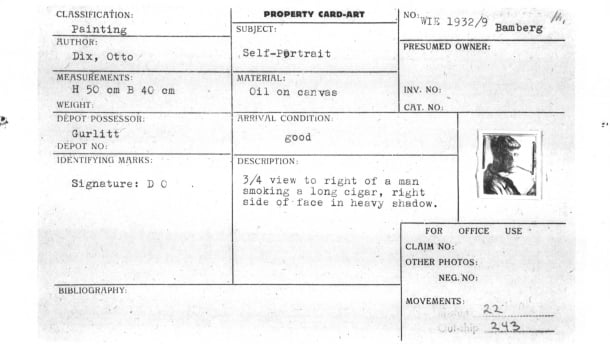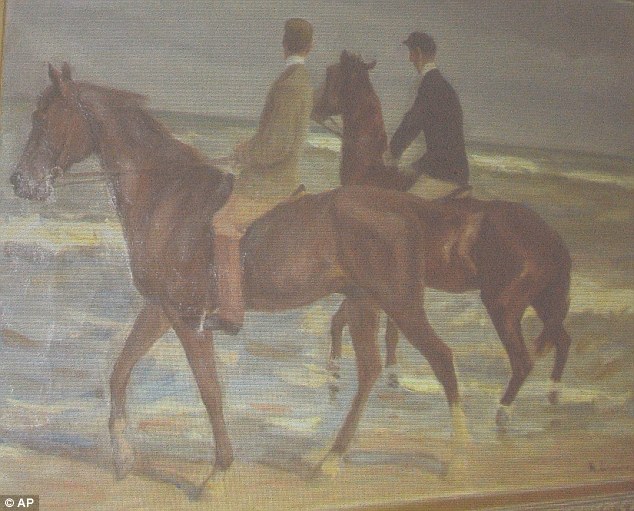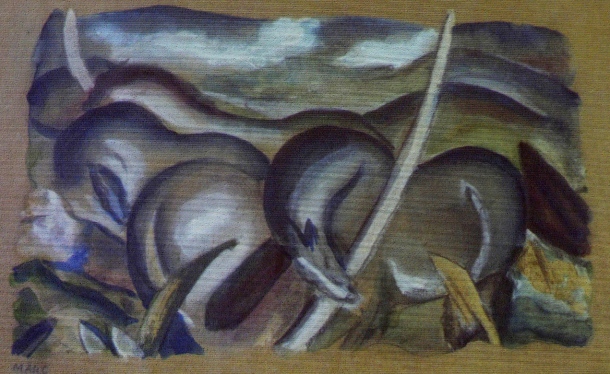Der Spiegel reports today (link in German) about how German museums are joining the chorus of frustration about the lack of information about the Hildebrand and Cornelius Gurlitt collection find. From this perspective, this development is not a surprise. I was speaking to an international law class last night at Sarah Lawrence College, and one of the students asked me what the reaction in Germany would be. My feeling was that sooner rather than later, the German museum community, and likely the federal government, will push for a forward-looking solution. Present-day Germany takes questions about the Holocaust quite seriously, and for this collection to have turned up in Germany is sparking an embarrassment that could lead to more decisive action. The problem right now seems to be that everyone is waiting for someone else to make the first move.
German Museums Join in Demands for More Information About Gurlitt; Links to the Amber Room Theorized; Dix Painting Was Not Unknown
Topics: Jeu de Paume, unbekannte Meisterwerke, February 13 1945, FAZ, Focus, Hildebrand Gurlitt, Dresden firebombing, Max Fisher, Cornelius Gurlitt, S. Lane Faison, Linz Führermuseum, Munich Central Collecting Point, Monopol, Wiesbaden Collecting Point, Dresden, HARP, Reinhard Nemetz, Max Liebermann, WWII, Monuments Men, Gurlitt Collection, Max Beckmann, Otto Dix, Degenerate Art: The Fate of the Avant-Garde in Naz, Auktionshaus Lempertz, Entartete Kunst, Fine Arts and Archives Program, Nazis, Marc Chagall, Organisation Todt, Paul Klee, Entdeckung verschollener Kunst, beschlagnahmte Bilder, Dresdner Bank, Belvedere, Fritz Todt, Holocaust Art Project, Hamburg Kunstverein, MFAA, Roberts Commission, Angela Merkel, Restitution, Wien, Monuments Fine Arts and Archives, Selbstporträt, World War II, degenerate art, Erben, Raubkunst-Bildern, Portrait of Wally, Washi, Löwenbändiger, Austria, Franz Marc, Oskar Kokoschka, Washington Principles, Ernst Ludwig Kirchner, München, Pablo Picasso, Dr. Herman Voss, Museums, Kristallnacht, Riders on the Beach, Hans Posse, Nazi Raubkunst, Vienna, Alfred Weidinger, Henri Matisse, Self Portrait, Emil Nolde
Focus Turns to Hildebrand Gurlitt’s Postwar Interrogation; Cornelius Gurlitt’s Whereabouts. Belvedere Official Questions Whether Collection Was Really a Secret
Topics: Jeu de Paume, unbekannte Meisterwerke, February 13 1945, FAZ, Focus, Hildebrand Gurlitt, Dresden firebombing, Max Fisher, Cornelius Gurlitt, S. Lane Faison, Linz Führermuseum, Munich Central Collecting Point, Monopol, Wiesbaden Collecting Point, Dresden, HARP, Reinhard Nemetz, Max Liebermann, WWII, Monuments Men, Gurlitt Collection, Max Beckmann, Degenerate Art: The Fate of the Avant-Garde in Naz, Auktionshaus Lempertz, Entartete Kunst, Fine Arts and Archives Program, Nazis, Marc Chagall, Organisation Todt, Paul Klee, Entdeckung verschollener Kunst, beschlagnahmte Bilder, Dresdner Bank, Belvedere, Fritz Todt, Holocaust Art Project, Hamburg Kunstverein, MFAA, Roberts Commission, Angela Merkel, Restitution, Wien, Monuments Fine Arts and Archives, World War II, degenerate art, Erben, Raubkunst-Bildern, Portrait of Wally, Washi, Löwenbändiger, Austria, Franz Marc, Oskar Kokoschka, Washington Principles, Ernst Ludwig Kirchner, München, Pablo Picasso, Dr. Herman Voss, Kristallnacht, Riders on the Beach, Hans Posse, Nazi Raubkunst, Vienna, Alfred Weidinger, Henri Matisse, Emil Nolde
Merkel Hints at Putting Gurlitt Lists Online, Calls for Special Tribunal Are Made
Catherine Hickley reports from Berlin that the government of Chancellor Angela Merkel is looking into ways to put lists and/or photographs online concerning the Cornelius Gurlitt seizure of roughly 1,400 paintings with connections to Nazi looting. This followed heavy complaints in the first days of the revelation, that the government had failed to identify what has been found. The biggest question remains why this remained a secret for roughly two years since the discovery. Merkel’s government claimed yesterday it learned of the find only in the last few months.
Topics: Stephanie Barron, Jeu de Paume, unbekannte Meisterwerke, Focus, Hildebrand Gurlitt, Theo Hermsen, S. Lane Faison, Linz Führermuseum, Munich Central Collecting Point, Wiesbaden Collecting Point, HARP, Max Liebermann, WWII, Monuments Men, Alt Aussee, Gurlitt Collection, Max Beckmann, Association for Research into Crimes Against Art, Monuments, Degenerate Art: The Fate of the Avant-Garde in Naz, Albrecht Dürer, Auktionshaus Lempertz, Entartete Kunst, Fine Arts and Archives Program, Nazis, Marc Chagall, Paul Klee, Entdeckung verschollener Kunst, beschlagnahmte Bilder, Holocaust Art Project, Judge Arthur Tompkins, Roberts Commission, Angela Merkel, Restitution, 1939 Galerie Fischer auction, World War II, degenerate art, Capt. Doubinsky, Los Angeles County Musuem of Art, Erben, Raubkunst-Bildern, Altmann v. Republic of Austria, Portrait of Wally, Löwenbändiger, Marc Masurovsky, Franz Marc, Oskar Kokoschka, Ernst Ludwig Kirchner, München, Pablo Picasso, ARCA, Lawyers' Committee for Cultural Heritage Preservat, Nazi Raubkunst, Henri Matisse, Emil Nolde
Paintings Targeted by the Nazis Found in Munich, Could be Biggest Discovery Since the War. What Now?
The German magazine Focus broke a story over the weekend that could be the biggest restitution news since Portrait of Wally or Altmann v. Republic of Austria: roughly 1,400 paintings were found in a Munich apartment that may have been seized, looted, or sold bought under duress by the Nazis in the 1930s as part of their drive to purge what they called “degenerate”—but extremely lucrative—art (the Focus coverage is extensive and excellent, though fair warning, in German). The paintings, which were apparently recovered not recently, but in 2011 as part of a customs seizure related to a currency declaration of all things, include works by Pablo Picasso, Henri Matisse, Marc Chagall, Emil Nolde, Franz Marc, Max Beckmann, Paul Klee, Oskar Kokoschka, Ernst Ludwig Kirchner, Max Liebermann and Albrecht Dürer, from collections traced back to Paul Rosenberg and others who had to abandon their property during the war, all long thought lost to the destruction of the war. They are valued in excess of 1 billion euros.
Topics: Stephanie Barron, unbekannte Meisterwerke, Focus, Hildebrand Gurlitt, S. Lane Faison, Linz Führermuseum, Max Liebermann, WWII, Monuments Men, Alt Aussee, Gurlitt Collection, Max Beckmann, Degenerate Art: The Fate of the Avant-Garde in Naz, Albrecht Dürer, Auktionshaus Lempertz, Entartete Kunst, Nazis, Marc Chagall, Paul Klee, Entdeckung verschollener Kunst, beschlagnahmte Bilder, Restitution, 1939 Galerie Fischer auction, World War II, degenerate art, Los Angeles County Musuem of Art, Erben, Raubkunst-Bildern, Altmann v. Republic of Austria, Portrait of Wally, Löwenbändiger, Franz Marc, Oskar Kokoschka, Ernst Ludwig Kirchner, München, Pablo Picasso, Lawyers' Committee for Cultural Heritage Preservat, Nazi Raubkunst, Henri Matisse, Emil Nolde
The Monuments Men, Social Media, the Law and Cultural Heritage-November 1, 2013 in New York
Next Friday November 1, 2013, the Lawyers' Committee for Cultural Heritage Preservation is holding its annual conference, and hosting and event entitled "The Monuments Men, Social Media, the Law and Cultural Heritage." It is being held at Fordham Law School, Lincoln Center Campus, 140 W. 62nd Street, New York, NY 10023, from 8:30 pm to 6:00 pm. Scheduled speakers include Robert Edsel and Lynn Nicholas. This is an all-star cast.
Topics: Darius Arya, Leila Amineddoleh, Chasing Aphrodite, Thomas R. Kline, George Clooney, Lynn Nicholas, Richard B. Jackson, The Rape of Europa, Diane Penneys Edelman, Robert Edsel, Lucille Roussin, Lincoln Center, Fordham Law School, Jason Felch, Irina Tarsis, Elizabeth Varner, Salam al-Kuntar, Events, David D’Arcy, Monuments Fine Arts and Archives Program, Holocaust Restitution and Claims Practicum, National Art Museum of Sport, World War II, Monica Dugot, Anne Rothfeld, Portrait of Wally, Marc Masurovsky, Lawyers' Committee for Cultural Heritage Preservat, Corine Wegener, Laurie W. Rush, James McAndrew
Rutgers Law Review Article Advocates Replacing Restitution Litigation with Prosecutions
The Rutgers Journal of Law and Religion has published a provocative article that advocates a bold new take on Holocaust art restitution litigation. The thesis of the piece is easily gleaned from its title: “Nazi Looted Art and Cocaine: When Museum Directors Take It, Call the Cops.” In a nutshell, the article argues that if artwork were stolen during World War II, it can never be acquired legitimately thereafter, and its possession is by definition a violation of the National Stolen Property Act, 18 U.S.C. § 2314—or even the Racketeer-Influenced Corrupt Organizations Act (RICO).
Topics: 18 U.S.C. § 2314, Girolamo Romano, Christ Carrying the Cross Dragged by a Rogue, Bakalar v. Vavra, Rutgers Journal of Law and Religion, Raymond Dowd, Egon Schiele, ARCA Conference, Portrait of Wally, RICO, Washington Principles, Racketeer-Influenced Corrupt Organizations Act, National Stolen Property Act, Copyright Litigation Blog
Despite Criticism of S.B. 2212’s Proposed Amendment to the FSIA, New Law Would Not Enable Stolen Art
Doreen Carvajal of the New York Times this week addressed Senate Bill 2212, (the “Foreign Cultural Exchange Jurisdictional Immunity Clarification Act”) this week, a bill approved in March by the House of Representatives.
Topics: Legislation, Russian art embargo, Nazi stolen art, Russia, Foreign Sovereign Immunities Act, 22 U.S.C. § 2459, Christ Carrying the Cross Dragged by a Rogue, Collections, FSIA, Restitution, World War II, IFSA, Foreign Sovereign Immunities, Portrait of Wally, Immunity from Seizure Act, New York Times, Chabad, Foreign Cultural Exchange Jurisdictional Immunity
Portrait of Wally in Hindsight: What did it Really Change?
A new piece at the Art Newspaper reflects on the importance of the Portrait of Wally case. Wally was seized in 1998 by customs officials on the theory that it was stolen property when imported into the U.S. The painting sat in a warehouse for 12 years, until a settlement returned the painting to Vienna in 2010 and a payment to Lea Bondi's heirs was made. I recall well the citywide celebrations in the Austrian capital when the painting returned; banners on lampposts proclaimed Bildnis Wally kehrt zurück—Portrait of Wally returns!
Topics: Maria Altmann, Portrait of Adele Bloch-Bauer, Malewicz v. City of Amsterdam, The Art Newspaper, 22 U.S.C. § 2459, FSIA, IFSA, Foreign Sovereign Immunities, Portrait of Wally, S.B. 2212, Immunity from Seizure Act, Customs, Gustav Klimt, Vienna
Commentary Takes Shape on S.B. 2212, the Foreign Cultural Exchange Jurisdictional Immunity Clarification Act
It’s been a few weeks since the House passed the Foreign Cultural Exchange Jurisdictional Immunity Clarification Act (H.R. 4086) and sent it on to the Senate for consideration as S.B. 2212. It has bipartisan sponsorship there (Dianne Feinstein and Orrin Hatch), but no word yet on when it will be put to a vote.
Topics: Girolamo Romano, Dianne Feinstein, Nazi-looted art, Foreign Sovereign Immunities Act, 28 U.S.C. § 1603, 22 U.S.C. § 2459, Christ Carrying the Cross Dragged by a Rogue, Hermann Goring, Collections, FSIA, Restitution, 19 U.S.C. § 1595a, Schneerson library, Orrin Hatch, Senate Bill 2212, World War II, IFSA, Foreign Sovereign Immunities, Portrait of Wally, Immunity from Seizure Act, Customs, Chabad, Foreign Cultural Exchange Jurisdictional Immunity





